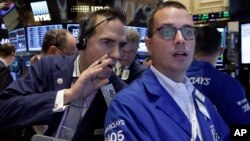Huge swings in stock prices around the world this week have investors and others wondering what happened, and trying to guess the future direction and strength of markets and the overall economy.
Monday saw New York’s Dow Jones stock index fall 1,000 points in a matter of minutes. The next day the Dow rallied more than 400 points, but fell again in the last hour of trading. Wednesday brought a surge of more than 600 points, one of the largest gains in history.
This week’s performance on the Shanghai Composite Index was so volatile that a graph of its prices looks like the steepest parts of the Himalaya Mountains.
The stock price plunge and partial recovery in China followed a move to cut the value of China’s currency, and a disappointing report on that nation’s industrial sector.
Many investors interpreted the data as evidence that China’s economy was slowing down more than first thought. China is the world’s second largest economy, and many years of roaring economic growth had made it a huge customer for raw materials, machinery and other goods from around the world.
China's trajectory
Slower growth in China means less demand for iron ore, crude oil, advanced machinery and so forth. That is why worries about China’s economic growth shook investors on stock and commodity markets around the globe.
Many analysts disagree on what caused the chaos on stock markets, and how much impact it will have on the global economy.
Nick Lardy, China scholar at Peterson Institute for International Economics, said many outsiders misunderstand what is going on in China. He said the economy is evolving from a focus on industry to expanding the services sector, and economic measurements have not kept pace with these changes.
That is why important parts of the economy are not fully counted by some analysts. He said China is on track for strong expansion and job growth this year.
American Enterprise Institute economist Desmond Lachman said China is in trouble because of an unsustainable surge in government and private debt over the past six years. Lachman said major debt burdens can fuel an unsustainable “bubble” in prices that could collapse.
